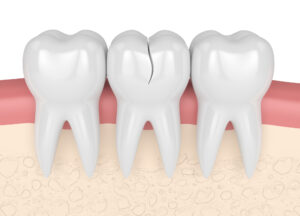Root Canals
A root canal treatment is a dental procedure used to treat infection at the center of a tooth (the root canal system). A root canal is needed when the pulp inside the tooth, which consists of soft tissue including nerves and blood vessels, becomes infected or damaged. The goal of a root canal procedure is to save the original tooth by removing infected tissue, sterilizing the area, and sealing off any remaining infection.
Treatment for Root Canal Infections
X-ray:
If a root canal is needed, a dentist will first take X-rays to determine the extent of the tooth damage.
Anesthesia:
The area around the tooth is numbed with a local anesthetic to ensure the patient is comfortable during the procedure.
Pulpectomy:
An opening is made in the crown of the tooth. The infected or damaged pulp is then carefully removed from the pulp chamber and root canals.
Cleaning and Shaping:
After the pulp is removed, the space is cleaned and shaped so it can be filled. This cleaning process helps to get rid of any lingering bacteria.
Filling:
The cleaned and shaped space is then filled to prevent bacteria from entering the tooth.
Restoration:
After the root canal therapy, the tooth is restored with a crown or filling for protection and will continue to function like any other tooth.
Types of Root Canal Treatment
- Traditional Root Canal Treatment: This approach involves the removal of the nerve and pulp from the center of the tooth. It’s the usual treatment for pulpal infections and injuries in the teeth.
- Surgical Root Canal Treatment: Surgical root canal treatment, also known as apicectomy, is employed when traditional methods are not viable. When other treatments have failed or when there is a post in the root, this procedure may be required. The infected root tip is accessed through the gum, treated, and finally sealed with a filling.
- Root Canal Treatment (RCT): Entails the removal of the pulp or nerve tissue from a tooth. In order to get rid of any underlying infection, the roots are carefully cleaned and shaped. The root canal system is then filled with a rubber-based substance to prevent bacteria and debris from entering. When pulp damage is irreversible, a root canal treatment (RCT) may be recommended to reduce or avoid symptoms. Tooth fractures caused by trauma or severe decay are common.
Frequently Asked Questions - Root Canals
What is a root canal, and why is it needed?
When the pulp or nerve tissue inside a tooth becomes infected or damaged, as might happen due to severe cavities or trauma, a root canal is performed to save the tooth. The contaminated tissue is removed, the tooth's interior is cleaned and sealed to prevent further infection, and the normal tooth is saved.
What are the signs that I might need a root canal?
Severe tooth pain, sensitivity to hot and cold temperatures, swollen or sore gums, and a pimple-like swelling on the gum near the damaged tooth are common indicators that signal the necessity for a root canal. Seeing a dentist as soon as possible is essential if you have any of these symptoms.
Are root canals painful?
Local anesthetic is used during root canal therapy to keep the patient pain-free. You might feel a little sore when the anesthetic wears off, but regular pain relievers should help.
How long does a root canal procedure take?
Several factors, including as the tooth's location and the complexity of the root canal, determine how long the surgery will take. The process usually takes between one and two hours. Your dentist will be able to give you a more precise estimate after examining your individual situation.
Is there an alternative to a root canal?
Extracting a tooth is the main option to getting a root canal. Saving a natural tooth, however, is the preferred option, as this improves long-term dental health and minimizes problems like tooth shifting and jawbone degradation that can result from tooth loss.
How long does it take to recover after a root canal?
Root canal treatment typically results in a speedy recovery. In the days following the surgery, you may feel some mild discomfort or sensitivity, but this is usually treatable with over-the-counter pain medications. In most cases, patients will be able to resume their normal activities right after.
Can a tooth that has had a root canal get infected again?
Although root canals are quite successful at removing infection, it is possible for the infection to return in extremely unusual circumstances. A new infection may emerge, or the sealing substance may weaken over time, both of which can lead to this. Such problems can be avoided with regular dental checkups and diligent practice of proper oral hygiene.
Is there any way to avoid needing a root canal?
The greatest method to avoid needing a root canal is to keep up a consistent routine of thorough brushing, flossing, and dental checkups. Cavities and other dental problems can often be prevented from requiring more extensive care if addressed early on.
Feel free to contact us for one-on-one assistance and advice if you have any further inquiries regarding root canals.
Personalized and high quality orthodontic care that you deserve

Latest Blogs

Restore a Tooth’s Function with Crowns or Bridges
When you have lost a tooth or when it is severely damaged, it is important to restore its function as soon as possible. One way

Cracked Tooth and Broken Teeth Treatment in Denver CO
If you are experiencing pain from a cracked tooth, don’t delay in seeking a broken teeth treatment in Denver, CO. See a dentist as soon

What Are Dental Veneers?
Dental veneers are a type of dental restoration that covers the tooth’s front surface to improve its appearance. Veneers can be made from diverse materials,

Beautiful Smile: How Professional Teeth Whitening Treatments Work
Did you know that tooth whitening is one of the most popular cosmetic dental procedures performed today? In fact, according to the American Academy of
Schedule your appointment now
Contact Us
Please contact us with any questions that you may have and a staff member will get back to you shortly.
- Monday:
- 8:00am-4:00pm
- Tuesday:
- 8:00am-4:00pm
- Wednesday:
- 8:00am-4:00pm
- Thursday:
- 8:00am-4:00pm
- Friday:
- 8:00am-4:00pm
- Saturday:
- By Appointment
- Sunday:
- CLOSED
Areas and Zip Codes We Serve
- Hampden
- Hampden Heights
- Hampden South
- Southmoor Park
- Goldsmith
- Virgina Village
- Kennedy
80210 80014 80111 80113 80121 80224
- Get on I-25 S from Champa St and W Colfax Ave(1.9 mi)
- Follow I-25 S to CO-30 E/E Hampden Ave. Take exit 201 from I-25 S (8.4 mi)
- Continue on CO-30 E/E Hampden Ave to your destination (0.9 mi) Artistic & Family Dental 3540 S Poplar St #301, Denver, CO 80237
- Get on I-25 N(2.6 mi)
- Follow I-25 N to CO-30 E/E Hampden Ave in Denver. Take exit 201 from I-25 N (8.6 mi)
- Continue on CO-30 E/E Hampden Ave to your destination (0.7 mi) Artistic & Family Dental 3540 S Poplar St #301, Denver, CO 80237











